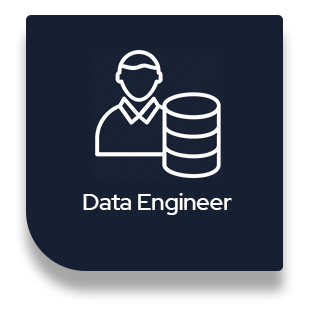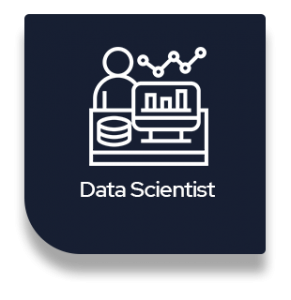Big Data is changing the way we do business and creating a need for Data Engineers who can collect and manage large quantities of data.
Data Engineering is designing and building systems for collecting, storing, and analyzing data at scale. It is a broad field with applications in just about every industry. Organizations can collect massive amounts of data, and they need the right people and technology to ensure it is in a highly usable state by the time it reaches data scientists and analysts.
In addition to making the lives of data scientists easier, working as a Data Engineer can allow you to make a tangible difference in a world where we’ll be producing 463 exabytes per day by 2025. That’s one and 18 zeros of bytes worth of data. Fields like machine learning and deep learning can’t succeed without Data Engineers to process and channel that data.
What does a Data Engineer do
Data Engineers work in various settings to build systems that collect, manage, and convert raw data into usable information for data scientists and business analysts to interpret. Their ultimate goal is to make data accessible so that organizations can use it to evaluate and optimize their performance. Listen to some practicing Data Engineers talk about what they do.
These are some everyday tasks you might perform when working with data:
- Acquire datasets that align with business needs
- Develop algorithms to transform data into useful, actionable information
- Build, test, and maintain database pipeline architectures
- Collaborate with management to understand company objectives
- Create new data validation methods and data analysis tools
- Ensure compliance with data governance and security policies
Working at smaller companies often means taking on more data-related tasks in a generalist role. For example, some more prominent companies have Data Engineers dedicated to building data pipelines, and others focus on managing data warehouses -populating warehouses with data and creating table schemas to keep track of where data is stored.
What’s the difference between a data analyst and a Data Engineer
Data scientists and data analysts analyze data sets to glean knowledge and insights. Data Engineers build systems for collecting, validating, and preparing that high-quality data. Finally, data Engineers gather and prepare the data, and data scientists use the data to promote better business decisions.
Why pursue a career in Data Engineering
A career in this field can be both rewarding and challenging. You’ll play an essential role in an organization’s success, providing easier access to data that data scientists, analysts, and decision-makers need to do their jobs. In addition, you’ll rely on your programming and problem-solving skills to create scalable solutions.
Data Engineers will be in demand if there is data to process. Dice Insights reported in 2019 that Data Engineering is a top trending job in the technology industry, beating out computer scientists, web designers, and database architects.
Data Engineer salary
Data Engineering is also a well-paying career. The average salary in the US is $115,176, with some Data Engineers earning as much as $168,000 per year, according to Glassdoor (May 2022).
Data Engineer career path
Data Engineering is only sometimes an entry-level role. Instead, many Data Engineers start as software engineers or business intelligence analysts. Then, as you advance in your career, you may move into managerial roles or become a data architect, solutions architect, or machine learning engineer.
How to Become a Data Engineer
With the proper skills and knowledge, you can launch or advance a rewarding career in Data Engineering. Many Data Engineers have a bachelor’s degree in computer science or a related field. By earning a degree, you can build a foundation of knowledge you’ll need in this quickly-evolving field. However, consider a master’s degree for the opportunity to advance your career and unlock potentially higher-paying positions.
Besides earning a degree, you can take several other steps to set yourself up for success.
Develop your Data Engineering skills.
- Learn the fundamentals of cloud computing, coding skills, and database design as a starting point for a career in data science.
- Coding: Proficiency in coding languages is essential to this role, so consider taking courses to learn and practice your skills. Common programming languages include SQL, NoSQL, Python, Java, R, and Scala.
- Relational and non-relational databases: Databases rank among the most common solutions for data storage. You should be familiar with both relational and non-relational databases and how they work.
- ETL (extract, transform, and load) systems: ETL is the process by which you’ll move data from databases and other sources into a single repository, like a data warehouse. Common ETL tools include Xplenty, Stitch, Alooma, and Talend.
- Data storage: Not all types of data should be stored the same way, especially regarding Big Data. As you design data solutions for a company, you’ll want to know when to use a data lake versus a data warehouse.
- Automation and scripting: Automation is necessary for working with Big Data because organizations can collect so much information. You should be able to write scripts to automate repetitive tasks.
- Machine learning: While machine learning is more the concern of data scientists, it can be helpful to grasp the basic concepts better to understand the needs of data scientists on your team.
- Big Data tools: Data Engineers work with more than regular data. They’re often tasked with managing Big Data. Tools and technologies are evolving and vary by company, but some popular ones include Hadoop, MongoDB, and Kafka.
- Cloud computing: You’ll need to understand cloud storage and cloud computing as companies increasingly trade physical servers for cloud services. Beginners may consider a course in Amazon Web Services (AWS) or Google Cloud.
- Data security: While some companies might have dedicated data security teams, many Data Engineers are still tasked with securely managing and storing data to protect it from loss or theft.
Get Certified
A certification can validate your skills to potential employers, and preparing for a certification exam is an excellent way to develop your skills and knowledge. Options include the Associate Big Data Engineer, Cloudera Certified Professional Data Engineer, IBM Certified Data Engineer, or Google Cloud Certified Professional Data Engineer.
Check out some job listings for roles you may want to apply for. If you notice a particular certification is frequently listed as required or recommended, that might be an excellent place to start.
Build a portfolio of Data Engineering projects.
A portfolio is often a key component in a job search, showing recruiters, hiring managers, and potential employers what you can do.
You can add Data Engineering projects you’ve completed independently or as part of coursework to a portfolio website (using a service like Wix or Squarespace). Alternatively, post your work to the Projects section of your LinkedIn profile or a site like GitHub—both free alternatives to a standalone portfolio site.
Start with an entry-level Position
Many Data Engineers, such as business intelligence analysts or database administrators, start in entry-level roles. However, gaining experience allows you to pick up new skills and qualify for more advanced positions. See an example of a possible learning journey with this Data Engineering Career Learning Path from Skilldacity.
Next steps
Whether you’re just getting started or looking to pivot to a new career, start building job-ready skills for roles in data with the Google Data Analytics, IBM Data Science, or IBM Data Engineering Professional Certificates with Skilldacity.



